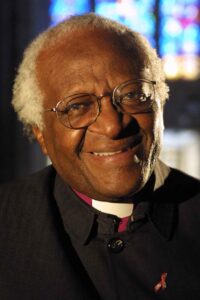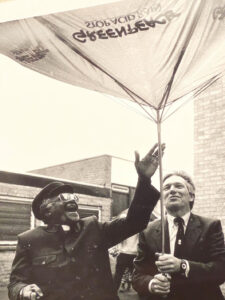Bernard Clarke, Caroline Roaf,
Jeanne Warren, Ann Watson

Photo by Benny Gool, Wikimedia Commons
Desmond Tutu’s death on 26 December brought world-wide outpourings of admiration, along with comprehensive analyses of his extraordinary life.
Several Friends share here their own memories of Tutu’s visits to Peers School in 1990, and the Sheldonian Theatre in 2010.
Bernard Clarke, Headteacher of Peers School 1988-1999:
One of a number of remarkable features of Peers School, Littlemore, in the 1980s and 90s was its well-established and very active link with Katumba II School in south west Tanzania. In alternate years, small groups of students and staff from each school would travel 5000 miles to spend a month living and working with their counterparts.
It was the link, in particular, that prompted a number of colleagues to get me to invite Archbishop Tutu to come to Peers during his visit to Oxford for an honorary degree – the sort of speculative letter headteachers sometimes write with no expectation of a reply.
So, what joy when, a few weeks later, his secretary rang to ask if he could come to lunch!
For many young people at that time, ‘Desmond Tutu’ was scarcely, if at all, a name. So the archbishop became a feature of the curriculum for every student.

Just as the wind turned the umbrella inside out …
Photo supplied by B. Clarke
The visit was for everyone, and the only space that could accommodate 500 students, the entire teaching and support staff, governors, and numerous visitors was the sports hall. Caroline Roaf, a stalwart of the Katumba Link, had been nominated chauffeur to collect the archbishop … because she had the cleanest car!
Inevitably, there was a hint of uncertainty about how several hundred young people would react to the arrival of somebody of whom they had only recently heard. As he beamingly walked into the sports hall, waving and shouting “Hello, everybody”, the spontaneous ovation was simply breathtaking. He then demonstrated his consummate ability to communicate with any and everybody. The entire audience was charmed into rapt silence … and laughter.
Lunch in the dining hall followed, and the archbishop greeted and shook hands with almost everybody in the queue, demonstrating his self-confessed ability to get to the front!
It was all over in a little over 2 hours, but what a privilege to be in the presence of one of the genuinely great men
of the age and what a genuinely unforgettable experience for everybody.
Walking around the campus during the afternoon, I came across a 15 year old, sitting by himself, crying. I
asked him what was wrong. His reply, ”He didn’t shake hands with me”.
Caroline Roaf:
I’ve been recalling Desmond Tutu’s visit and the amazing experience of picking him up and driving him to Peers School. (I was selected because I had just taken ownership of a second-hand car, and a colleague, when asked who should be the taxi, pointed at me and declared mine to be the only clean car on the campus.)
But the real surprise to me – never having met any kind of celebrity before – was his professionalism.
I’d collected him at Christ Church with his chaplain (his wife was driven in a second car by Paul Wilmott); after about two minutes chit chat he suddenly turned to me (as I quivered with fright in case I drove into something on the journey) and said “Now tell me about the school”. I had to think faster than I’ve ever thought in my life to give him some salient points: the Tanzania link (which was in process); the curriculum; the ‘every child matters’ philosophy; and I can’t remember what else.
BUT we eventually got to the Sports Hall (his weight having nearly broken the car’s axle as we drove in over humps etc. on the way). When he addressed the audience (and who will ever forget that), blow me down if he didn’t weave in everything I’d told him. I was utterly gobsmacked at his pure professionalism and what to me was the unimaginable skill of a superstar. He’d absorbed what he needed with a mere ten minutes notice, and then turned that into something to inspire hundreds of youngsters and their teachers for ever.
And it was pouring with rain – and I happened to have a large green brolly which he borrowed, and I kept it as a souvenir for years and years until it utterly fell apart …
Anne Watson:
Some time in the early 90s Desmond Tutu was visiting Oxford on his way to an Anglican conference. I was teaching in Peers School, which at that time was the most racially and socially diverse school in Oxford. Bernard Clarke was the headteacher, and other Friends and attenders were also there.

One of the staff was married to one of the people at Christchurch who were hosting Desmond, so she suggested he might visit our school. We were not used to having whole-school assemblies of any kind, and the only place everyone would fit in was the public Sports Hall, with everyone sitting on the floor. Imagine that – about 500 adolescent students (I am guessing the numbers) unusually sitting on the floor waiting for an unusual event.
It was raining heavily, and soon a diminutive figure under a huge umbrella appeared at the entrance. Instantly everyone fell silent. His charisma filled the hall as he beamed and spread his arms wide as if to hug everyone. He had recently coined the phrase ‘rainbow nation’ for South Africa. As he appeared to embrace them with his gesture he called them the ‘rainbow people’ and told them that without all the colours there would be no rainbow – the sign of hope.
It was very moving to see the students’ reactions to this tiny black very important person speaking to them as if they were special.
Jeanne Warren:
Desmond Tutu died early on Boxing Day. I feel lucky to have heard him in person once in my life, when he gave a talk in the Sheldonian some years ago on a visit to Oxford.
He had a wonderful presence. I remember him telling us all that God loved us. He opened with a typical bit of humour, remarking that there was an Oxford degree called a ‘Desmond’: a 2–2.
| Next Article |
Back to January 2022 Newsletter Main Page
Forty-Three Newsletter • Number 513 • January 2022
Oxford Friends Meeting
43 St Giles, Oxford OX1 3LW
